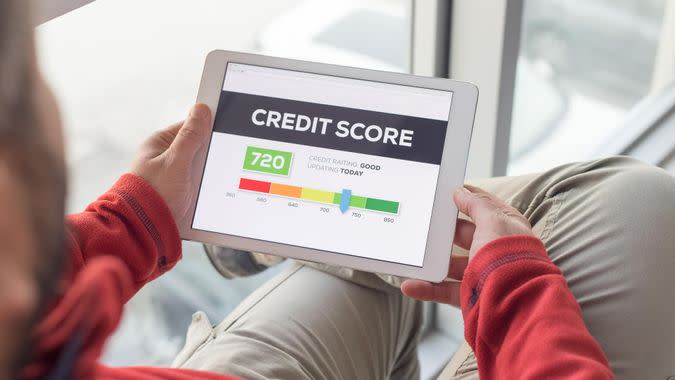Credit Cards 101: A How-To Guide for Gen Z

Just as it was with generations past, legions of Gen Zers are leaving high school and entering adulthood knowing that Crispus Attucks was the first person killed in the Boston Massacre and that the FOIL method is a good way to solve algebraic equations. But ask a random sampling of those same recent grads how credit works, how interest compounds and how lenders size them up when they apply for loans, and — just as with generations past — most would have no idea whatsoever.
The ABCs of Credit: Tips To Be Smarter With Your Finances
Learn: 18 Reasons Why You Should Be Using Your Credit Cards More
Just because it isn’t taught in school doesn’t mean it’s not important, and throughout your life, few things will be more important than your relationships with the lenders who issue your credit cards. The decisions you make with the plastic in your wallet will follow you for years and play a key role in whether or not you’re able to buy a home, lease a car or get a job.
If you’re just now dipping your toes into the waters of revolving credit, beware — many who came before you have drowned. But if you know what you’re getting into, there’s nothing to fear and plenty to look forward to as your credit score rises and your financial health improves. Here’s what you need to know.
Last updated: Sept. 14, 2021

Wait! Don’t Submit That Application Just Yet
If you don’t know much about credit cards other than that you want one, don’t submit an application just yet. If you have already, don’t do it again. By applying, you’re giving the bank permission to conduct a kind of credit background check called a hard inquiry or hard pull.
Whether you realize it or not, three organizations known as credit bureaus — Experian, Equifax and TransUnion — have been recording all of your important financial data and organizing it into a personal profile called a credit report. Everything on it will follow you for years, so don’t apply for credit willy-nilly. Just the act of applying goes into your report and can hurt your credit score, which is kind of like a numerical report card of your financial health.
Score Don'ts: 30 Things You Do That Can Mess Up Your Credit Score

Find Out What They’ll See Before They See It
You’re entitled to one free copy of your full credit report once a year, which you can get from AnnualCreditReport.com. Free monitoring services like Credit Karma offer reliable unofficial reports. If you haven’t already, make this your first move. The information in your report will determine if you’re approved for a card and what your credit limit and interest rate will be.
Reports can and sometimes do contain errors that can hurt your score — but you won’t know until you look. It’s not just credit cards. Landlords, mortgage lenders, insurers and employers will examine this information for the rest of your life. It’s impossible to be financially responsible if you don’t know and manage the contents of your credit report.
Learn: 10 Credit Score Myths You Need To Stop Believing

Understand How Your Credit Score Is Calculated
A data analytics firm called FICO maintains the most commonly used credit scoring system, which ranges from 300-850 — higher is better — and is grouped into five categories:
Payment history — 35%: Making at least the minimum payment on time, every time is the single best way to build credit. Nothing is more important for your score.
Amounts owed — 30%: Lenders like to see lots of open credit with less than 30% of your available credit utilized.
Length of credit history — 15%: The longer you use your credit responsibly, the higher your score will be.
New credit — 10%: Applying for new credit too frequently can look suspicious to lenders.
Credit mix — 10%: Lenders like to see that you’re responsibly managing a blend of different kinds of credit, like auto loans, mortgages and personal loans.
Check Out: This Easy Trick Will Improve Your Credit Score and Avoid Late Payments

If It’s Not Part of Your Score, It Can Still Hurt You
Your income does not factor into your credit score, nor does your age, where you live, your occupation, employer or length of employment. But lenders can and do factor all those things into their decisions. While tax liens and civil judgments no longer impact your credit score, lenders can see them on your credit report and factor them heavily into their decisions. Things like race, religion, gender, marital status or sexual orientation are not factored into your credit score, and lenders are forbidden by law from considering them when making decisions.
Defined: What Is a Good Credit Score?

Never Spend What You Can’t Pay in Full
There are all kinds of credit cards for all kinds of people, but the same basic rules always apply. It can be good to put some or even most of your purchases on a credit card, but only if you have the cash to pay off your statement balance in full every month. Do that, and you’ll avoid finance charges, but if you carry a balance, you’ll pay interest at whatever annual percentage rate (APR) your lender charges.
Find Out: How Much Debt Americans Have at Every Age

Beware of the Minimum Payment Trap
Every month, you’ll have to make at least the minimum payment, which is just enough to keep you in good standing in a jam but a terrible long-term strategy. People who don’t pay their balance in full carry a revolving debt, but those who pay only the minimum carry a revolving debt into eternity — and they’re the bank’s favorite customers. According to Debt.org, it would take more than 13 years of minimum payments to pay off a $1,500 charge at an APR of 18%, and it would cost you $1,792.52 in interest — more than the original charge.
See: 16 Key Signs That You Will Always Be In Debt

Apply For a Card That Suits Your Style
If you carry a revolving balance, the credit card company always wins, but if you satisfy your statement every month, you can turn the tables and take money from the bank in the form of cash back, airline miles, free hotel stays and other rewards. Some cards give you points or cash back at a flat rate that’s the same for every purchase. If you’re really organized, you can get extra points for specific categories — like gas or groceries — that rotate throughout the year. Some cards charge annual fees, which only make sense if you use the card’s rewards enough to justify the expense.
Explore: The Best Credit Card for Each Type of Spender

Some Cards Are Meant for Building Credit
Many Gen Zers don’t have any credit history for a lender to examine, but an empty credit report isn’t the same as a bad one. Some lenders offer cards that are designed specifically to help cardholders get into good habits and build credit over time. Some are secured, meaning that you put money up in advance and that becomes your credit limit — but unlike a debit card, the issuer will report your payments every month to the credit bureaus. Other credit-building cards are unsecured, just like standard cards, including many cards designed for students.
More: 30 Things You Need To Know To Build Credit

Get Used To Paying on Time, But You Do Have a Grace Period
If you do miss a payment, don’t panic. Your lender won’t report it to the credit bureaus until 30 days have passed since your due date. That means that if you forget to pay, you can avoid a hit to your credit score and a black mark on your report — and both are guaranteed if you miss a payment — as long as you settle up within a month. You will, however, almost certainly be hit with a late fee and perhaps other penalties.
Find Out: How Long Does a Late Credit Card Payment Stay on Your Credit Report?

If You Get Into Trouble, Talk To Your Lender
If you don’t pay your bill on time, you can expect lots of phone calls and emails during that 30-day grace period. Don’t avoid them. It’s natural to want to hide your head in the sand if you fall behind on your bills, but communication is key. If you have trouble paying your bill — particularly if you can demonstrate hardship — your bank will work with you.
If you simply ignore it and stop paying, your lender will report you as delinquent after 30 days, but this is still fixable over time. After 60 days, your credit will take a damaging hit that could take years to repair. After 90 days, some credit cards will write you off as a loss and sell your account to a collections agency — all will after 180 days — and when that happens, your credit will be shot and you’ll be a toxic borrower for years to come.
More From GOBankingRates
This article originally appeared on GOBankingRates.com: Credit Cards 101: A How-To Guide for Gen Z
